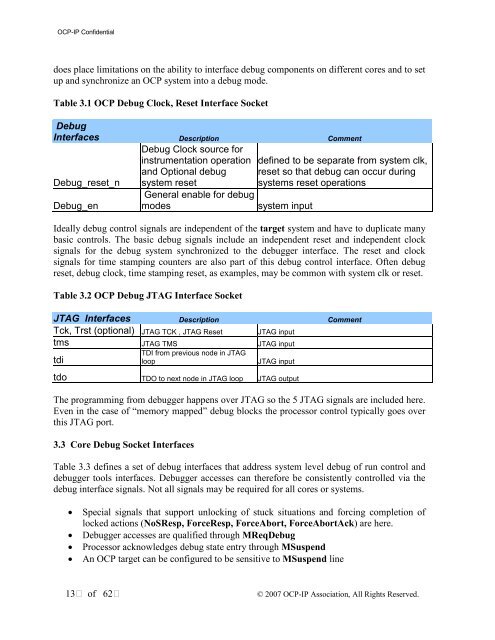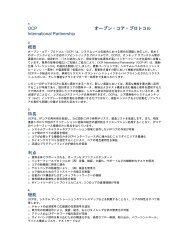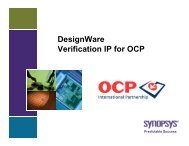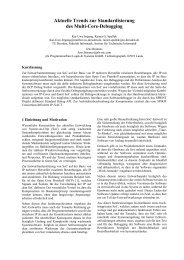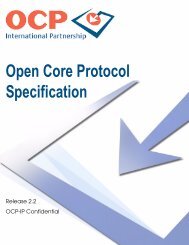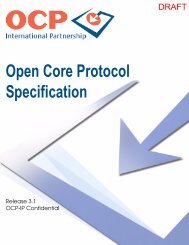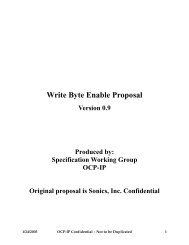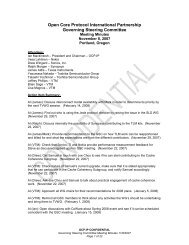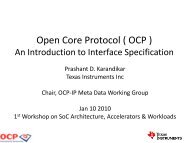Open Core Protocol Debug Interface Specification rev 1.0 - OCP-IP
Open Core Protocol Debug Interface Specification rev 1.0 - OCP-IP
Open Core Protocol Debug Interface Specification rev 1.0 - OCP-IP
Create successful ePaper yourself
Turn your PDF publications into a flip-book with our unique Google optimized e-Paper software.
<strong>OCP</strong>-<strong>IP</strong> Confidential<br />
does place limitations on the ability to interface debug components on different cores and to set<br />
up and synchronize an <strong>OCP</strong> system into a debug mode.<br />
Table 3.1 <strong>OCP</strong> <strong>Debug</strong> Clock, Reset <strong>Interface</strong> Socket<br />
<strong>Debug</strong><br />
<strong>Interface</strong>s Description Comment<br />
<strong>Debug</strong>_reset_n<br />
<strong>Debug</strong>_en<br />
<strong>Debug</strong> Clock source for<br />
instrumentation operation<br />
and Optional debug<br />
system reset<br />
General enable for debug<br />
modes<br />
defined to be separate from system clk,<br />
reset so that debug can occur during<br />
systems reset operations<br />
system input<br />
Ideally debug control signals are independent of the target system and have to duplicate many<br />
basic controls. The basic debug signals include an independent reset and independent clock<br />
signals for the debug system synchronized to the debugger interface. The reset and clock<br />
signals for time stamping counters are also part of this debug control interface. Often debug<br />
reset, debug clock, time stamping reset, as examples, may be common with system clk or reset.<br />
Table 3.2 <strong>OCP</strong> <strong>Debug</strong> JTAG <strong>Interface</strong> Socket<br />
JTAG <strong>Interface</strong>s Description Comment<br />
Tck, Trst (optional) JTAG TCK , JTAG Reset JTAG input<br />
tms JTAG TMS JTAG input<br />
TDI from p<strong>rev</strong>ious node in JTAG<br />
tdi<br />
loop<br />
JTAG input<br />
tdo TDO to next node in JTAG loop JTAG output<br />
The programming from debugger happens over JTAG so the 5 JTAG signals are included here.<br />
Even in the case of “memory mapped” debug blocks the processor control typically goes over<br />
this JTAG port.<br />
3.3 <strong>Core</strong> <strong>Debug</strong> Socket <strong>Interface</strong>s<br />
Table 3.3 defines a set of debug interfaces that address system level debug of run control and<br />
debugger tools interfaces. <strong>Debug</strong>ger accesses can therefore be consistently controlled via the<br />
debug interface signals. Not all signals may be required for all cores or systems.<br />
• Special signals that support unlocking of stuck situations and forcing completion of<br />
locked actions (NoSResp, ForceResp, ForceAbort, ForceAbortAck) are here.<br />
• <strong>Debug</strong>ger accesses are qualified through MReq<strong>Debug</strong><br />
• Processor acknowledges debug state entry through MSuspend<br />
• An <strong>OCP</strong> target can be configured to be sensitive to MSuspend line<br />
13 of 62<br />
© 2007 <strong>OCP</strong>-<strong>IP</strong> Association, All Rights Reserved.


